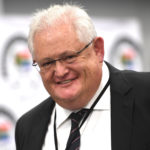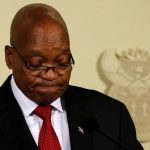ANC need not ask for whom the bell of blame tolls
Why and how has South Africa’s post-1994 parliament developed an attitude of such deference to the executive? The answer is discomfiting, and lies within the ruling party itself.
Author:
8 February 2019

First, there was the gathering of the Friends of Jacob Zuma’s Fluffers Club. Those that had apparently protected and pumped up the former president’s kleptocratic tenure congregating on the steps inside parliament for a photo as if it were the Serengeti during migration: Nomvula Mokonyane, Faith Muthambi, Bathabile Dlamini and other Homo Nkandlas baring crocodile smiles for the media. All while a fashion parade of vacuous consumption strutted past cooing cameras.
Then the main act. President Cyril Ramaphosa delivering the annual State of the Nation Address on 7 February. He made a cursory acknowledgement to the poor. He ignored the role popular organisation and struggle could play in resuscitating South Africa’s future. He fellated business and investors like a crackhead approaching their first pipe in three days.
This was “pomp and ceremony”. Grandeur and 21-gun salutes. The hallowed halls of parliament where the republic would be updated by the president on the mess it is intent on emerging from, and a new future. A reassurance that even if the “milk of human kindness” in our body politic had “turned sour” we could still become the country we had hoped to be 25 years ago when all South Africans voted for the first time, and the possibility of an equitable society appeared possible. We could still make curd, and cheese. Allegedly.
For there was a stampede of elephants in the room. None more glaring than member of parliament (MP) Vincent Smith, implicated for allegedly receiving monthly bribes of R100 000 per month in the Bosasa-linked revelations at the commission of inquiry into state capture chaired by Deputy Chief Justice Raymond Zondo in Johannesburg. Smith was chairperson of the correctional services portfolio committee during a period when Bosasa was closing multi-billion deals for prison catering.
When Ramaphosa mentioned the parliamentary review committee investigating amendments to section 25 of the Constitution the television cameras panned to Smith, one of its members. His head was down. His eyes staring at his lap. A fellow MP poked at his downcast reverie — several times. Smith finally looked up. The dark luggage under his eyes heavier than a Louis Vuitton bag with R300 000 stuffed inside.
Related article:
During apartheid parliament was the law, and a rubber-stamp for the regime’s atrocities. South Africa’s post-1994 constitutional dispensation was intended to change all that by creating checks and balances for the executive and legislature. A forward-looking Constitution, not the arbitrary whims and fancies of the powerful, was supposed to be the final word, interpreted by the judiciary.
But democratic South Africa’s parliament has developed a pathology of obsequious deference to the executive. It has failed to provide oversight for the executive allowing, especially during Zuma’s tenure, untrammelled excesses and a pervasive lack of accountability for those wielding the people’s power in trust. None more obvious than the gymnastic contortions that MPs performed in protecting Zuma from being held accountable for paying back the money on tax-payer-funded upgrades to his private Nkandla residence as recommended by then public protector, Thuli Madonsela.
Earlier, on Thursday morning, outside parliament, chairperson of the national council of provinces Thandi Modise told eNCA that they needed to “relook” at why parliament was not performing its oversight function. She talked about the the churn of parliamentarians after every election which had eroded institutional memory and suggested MPs were not properly equipped actually to do their jobs rigorously.
Parliamentary churn is especially prolific within the majority ANC. It is a direct result of a shift in how the party self-actualises and subsequently acts. The ANC has moved from liberation organisation to a governing party with liberation values (and a prickly skin when facing criticism) to a corrupted party of racketeers and kleptocrats.
The ANC’s Zuma years oversaw the emergence of regional power bases and patronage networks which conflated state (structures and resources) and party (structures and self-enrichment) and which rewarded internal support with government jobs: in municipalities, provincial governments, the two houses of parliament and Cabinet.
Zuma performed his most delicate balancing act in ensuring all these regional support bases were represented in parliament and the executive. He promoted the venal and the mediocre as he sought to dumb down these arms of government to allow for his unhindered exercise of executive power. He required the state to be dysfunctional to stay out of the courts and prison. A broken state and a broken parliament would allow this, and the pillaging of the fiscus, too.
But as evidenced by former ANC chairperson of the correctional services portfolio committee, and current Congress of the People MP Dennis Bloem’s testimony at the state capture commission recently, the rot did not start with Zuma. His years in charge of the ANC and the country appeared merely the next step in the evolution of the ANC from its pre-1994 days to the present.
Related article:
Bloem was chairperson of the correctional services portfolio committee from 2004 to 2009. During that time, when Thabo Mbeki was president of the country and the ANC, the privatisation of state functions already had momentum.
Bloem told the Zondo commission that despite repeated requests his committee was never furnished with the feasibility study to under-gird the prisons department’s privatisation of services like catering. The deals with Bosasa, amounting to billions of rands, were signed despite the committee’s sense that catering should remain in-house and that the money would be better spent on increasing the “poor salaries” of staff and building “dedicated juvenile facilities” so as to prevent their rape in cells where they were left with adults.
Bloem and his committee had asked for documents and answers. They got nothing. The tenders were signed, regardless. Bloem told the Zondo Commission that they were “simply ignored” with “no consequences” for then minister Ngconde Balfour, his director-general, or anyone else in the department.
This was part neo-liberalisation of the state and part pillaging of it. Bloem talked of raising the committee’s concerns over the Bosasa deal, and the executive’s ignoring of the oversight committee’s request for information with then speaker Max Sisulu, Balfour himself and then chair of the ANC caucus, Vytjie Mentor. Aside from Mentor, who “held discussions” with Balfour, no one did anything.
“All ANC members in parliament were aware of the problem but nobody did anything about it,” Bloem told the commission. Instead, Bloem was told to not cause a stir “because it was an ANC government” and was assured that the concerns would be resolved.
They never were. Bosasa grew to the point where it was paying out between R4-6-million in bribes to politicians and government officials every month. Many of them linked to the ANC.
If Ramaphosa, Modise and others want to learn why the ANC majority in parliament remains supine and is not performing its oversight responsibilities with rigour and efficacy, it need only look at the testimony at the Zondo Commission. And then within themselves and their party.


